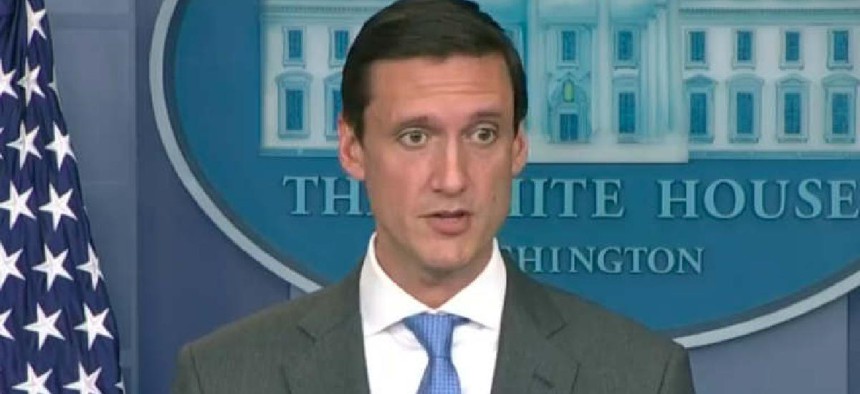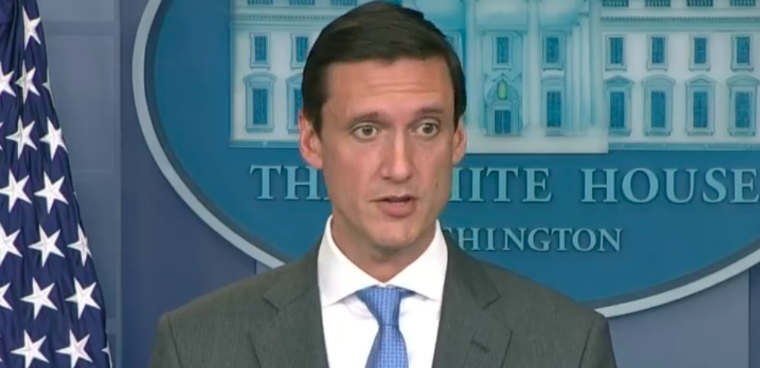Bossert out as homeland security adviser

In yet another shake-up of the Trump administration's national security team, Tom Bossert resigned from office one day after John Bolton started as National Security Adviser.

White House Homeland Security Advisor Tom Bossert, shown here at a December 2017 press briefing, is stepping down.
Tom Bossert stepped down as White House Homeland Security Advisor April 10 in another major shake-up of Donald Trump's homeland and national security team. Cybersecurity was a key part of Bossert's portfolio.
The resignation came one day after John Bolton started as national security advisor and the same day that Department of Homeland Security officials kicked off a three-day exercise meant to test how federal agencies, state and local governments, private sector companies and critical infrastructure entities coordinate and respond in the face of a major, nationwide cyberattack.
Rob Joyce, the White House cybersecurity coordinator, will take over on an acting basis, according to multiple media reports. Joyce, a 2018 Federal 100 award winner, is a former National Security Agency official who had leadership roles in both the offensive and defensive sides of the spy agency.
"The President is grateful for Tom's commitment to the safety and security of our great country," said White House spokesperson Sarah Sanders said in a statement. "Tom led the White House's efforts to protect the homeland from terrorist threats, strengthen our cyber defenses, and respond to an unprecedented series of natural disasters. President Trump thanks him for his patriotic service and wishes him well."
Bossert often acted as the face of the administration during high-profile cyber incidents and has been instrumental in shaping the White House's cybersecurity strategy during the first year of Donald Trump's presidency.
Over that time, the U.S. has become more active in combatting the threat of nation state hacking groups and shoring up federal cybersecurity through executive orders and IT modernization efforts.
Bossert also oversaw coordination with intelligence agencies to identify countries behind major cyber attacks like WannaCry (North Korea), NotPetya (Russia) and implementing "name and shame" tactics paired with economic sanctions to bring international pressure down on malicious actors.
“This is bad news," Sen. Sheldon Whitehouse, D-R.I., said. "Bossert was a knowledgeable professional and the best person in the administration on cyber security. Cyber security ought to be an area for bipartisan legislative progress; it is urgently needed. Bossert’s departure makes that even less likely.”
"Over the last 15 months I have enjoyed working with Tom on a range of current and emerging threats to our nation -- particularly in cyber security and disaster response," said Homeland Security Secretary Kirstjen Nielsen in a statement.
The administration has also been criticized by cybersecurity experts and members of Congress for failing to articulate a comprehensive, unified cyber doctrine to guide the various agencies responsible for defense and offense of federal networks, the private sector and critical infrastructure.
Trevor Rudolph, a former Obama administration cybersecurity official, tied the decision to Bolton's hiring and said it offered the NSC an opportunity to hit the reset button when it comes to holding nation states accountable for cyber campaigns directed against the United States.
"It's clear to me that Tom Bossert and John Bolton had divergent strategic views regarding cyber deterrence and other national security topics," said Rudolph. "In my view, the current and former administrations have struggled to impose significant costs on foreign actors for malicious cyber activity. Tom Bossert's resignation provides an important opening to National Security Adviser, John Bolton, and his allies who would like to ratchet up those costs."


